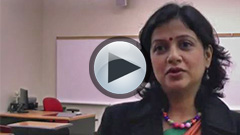A visiting professor from India spent a week teaching in the School of Business and Economics this fall as part of an initiative to expand cultural and global awareness of students and faculty. This is SOBE’s second weeklong visitor; last year a scholar visited from Austria.
Dr. Ipseeta Satpathy, associate professor of Organisational Behaviour & Human Resource Management at the School of Management (KSOM), KIIT University (Kalinga Institute of Industrial Technology), lectured on “Doing Business in India” in several classes.
India’s strengths lie in information technology, a young, well-educated population, and a cheap labor force, she said.
Dr. Satpathy noted that the U.S. is the largest investor in India, but there are several cultural differences that Americans need to be aware of. In India, like much of Asia, there is a collectivist culture, rather than an individualistic one. “Any work accomplished in India is teamwork,” she said.
To work in India also requires establishing and cultivating long-term relationships, she said, adding that the Indian workforce is a very diverse place and people from all backgrounds work together well.
Indian women traditionally wear saris in the workplace, but foreigners are not expected to do likewise, Dr. Satpathy said. She also noted that foreigners should wait for women to extend their hands for a handshake. Traditionally Indians greet each other with hands in prayer pose and the word, “Namaste.”
While Hinduism is the dominant religion India celebrates all major religious holy days as national holidays, Dr. Satpathy said.
Many Indians speak English because of the legacy of British control; however, Hindi is the primary language, which can make communication difficult because of “a lot of mother tongue influence with English.”
Dr. Satpathy also said many Indians speak loudly and that foreigners sometimes misinterpret that as argumentative, but she added, “It’s just the way we speak.”
While Americans have misconceptions about India, the reverse is also true. “In India we think America can’t be affected by a recession,” Dr. Satpathy said.
She also noted that Walmart is moving into India with a promise from the Indian CEO that it won’t steal jobs from small merchants and farmers. She said she was not aware of the reputation Walmart has for doing just that in the U.S.
Dr. Satpathy noted several times that Indians have a great respect for the U.S. “Our students always would like to come her for their vocation,” she said. “All our best brains are here.”


